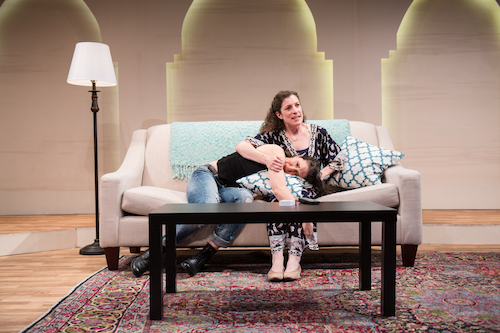
Playing in Toronto, Kiss is a surprising, powerful show that could dive a bit deeper
Guillermo Calderón’s Kiss, presented by Theatre Smash and ARC and now playing at Canadian Stage’s Berkeley Street Theatre, is a show that goes from 0-60 at lightning speed. Audience members are initially treated to a chuckle-worthy melodrama featuring an intense love quadrangle, seemingly inexplicably set in Damascus.
But not all is as it appears to be, and the twists and turns of the play rapidly change it from soap opera to something much deeper. Kiss is a powerful show that will keep you thinking about it long after the actors have left the stage, but its deceptions and pointed commentary prove to be both its greatest strengths and its greatest weaknesses.
It’s impossible to speak about Kiss without giving some things away, and I make no promises here (much like the show itself). Suffice it to say that this is a play with three very different “stages.” First, there is the deliberately-hacky staging of the Syrian melodrama, which we’re told was discovered on the Internet.
This unfolds as the four characters gather to (in meta fashion) watch a soap opera: Youssif (Greg Gale) confesses his undying love to Hadeel (Naomi Wright), the girlfriend of his best friend Ahmed (Carlos González-Vío). She, though nauseated at her own feelings, returns his love over her concern for Ahmed and for her own best friend, Youssif’s girlfriend Bana (Dalal Badr). Ahmed arrives, ready to propose to Hadeel, and Bana’s arrival shows she’s been broken up with over false pretenses. The actors do an excellent job of conveying the over-the-top material in a self-consciously professional way, concentrating attention on the peculiarities of the script.
At this point, I settled in for a commentary on the human need for melodrama and its inherently conservative viewpoint, reassuring us of and promoting the normality of our own lives. As the audience laughs at the lyrical, painfully earnest declarations, all of a sudden we’re faced with a very different show that blurs the lines between reality and script.
The actors set us up for what appears to be a talkback, declaring excitedly that they’ve finally managed to contact the playwright, a young Syrian woman (Bahareh Yaraghi) fleeing her country’s devastation, over Skype, and will now ask her questions via her translator (Liza Balkan).
We find out, through this increasingly painful series of questions, that there are hidden meanings in the melodrama, accessible only to someone who has lived through or cares enough to be aware of the intimate details of the Syrian crisis. The melodrama itself is a veneer of comfort to a population that has little left.
As the actors—chastened by their failure to understand—“try again,” the play becomes a biting criticism on the West’s ignorance of the world’s horror, and of well-meaning artistic gestures that lack context or knowledge: the desire to represent without actually understanding. It makes fun of the passionate but utterly clueless actors, and the Western audience’s own unwillingness to fully involve ourselves by embracing irony.
Even the set takes part in emphasizing the initial disconnect: attractive and sterilely realistic, it’s a take on any living room set you’d see from a well-funded professional company with tiny bits of Middle Eastern flavour tacked on. From the beginning, we can see through the apartment’s front wall, suggesting a hidden transparency, and as the message breaks down, the set increasingly does too.
There are several twists in this play, and at certain junctures, it’s difficult to tell whether or not the “off-script” moments are scripted. This is quite effective at first, but as the surprise wears off, it starts to feel manipulative. Though I still feel the play is important in its ability to unsettle and generate self-questioning, there’s something smug about how it makes fun of smugness, complacent about how it makes fun of complacency by using familiar theatrical techniques.
In an attempt to present the play more genuinely, it falters, and the attempts feel like a gloss. This third “stage” raises questions about whether context elevates entertainment into being meaningful, regardless of its original qualities. With a little more time, maybe we could answer these questions, but right now, this Kiss feels like a pulse-raising but glancing peck.
Details:
- Kiss is playing at the Berkeley Street Theatre Upstairs (26 Berkeley Street) until April 16, 2017.
- Performances are Tuesday-Thursday and Saturday at 8:00PM, Friday at 7:00PM, with Wednesday and Saturday-Sunday matinees at 1:00Pm.
- Tickets are $35-69 and can be purchased online or by calling the box office at 461-368-3110.
Photo of Dalal Badr and Naiomi Wright by James Heaslip

Great Theater with an underlying message!
Superb play, excellent performances. The experience was riveting and thought provoking. This review, however, misses the mark. The play is not a just a critical statement about media representations of wars in distant lands. It is a visceral and experiential counterpoint to those representations, with layers of meaning that unfold throughout the second part of the play. It is one of the most moving and memorable plays I have seen.
I saw the play tonight. One of the most moving theater pieces I’ve seen. Having said that, I didn’t feel anymore educated on the Syrian conflict than I did going in, nor did I feel a stronger connection to their plight. Was it all just a well-executed exercise in Brechtian form? I don’t know. Many theatrical tropes are blended together and conjure up strong feelings. The actors give athletic performances. When I came out, I was genuinely thinking about what I could do to help the Syrians. I was nicer to the homeless guy on the street. It’s a hard show to describe and hopefully some critic out there can better articulate what I felt than I can.